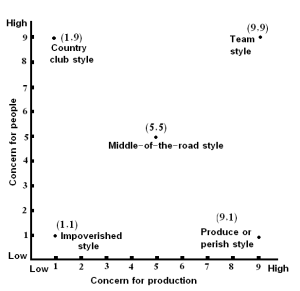I have updated something I wrote some years ago in the belief that it might be useful to some people;
The 'Ethics of Leadership' - through serving Universal Participation
a ‘1-page’ Development Programme for LSAs & other Baha'i Institutions - to release the power for success
There are two sources for guiding principles in this programme:-
i) The principles of Universal Participation, transformation & effective planning - called for by The Universal House of Justice
ii) The principle enshrined in this statement by the Guardian on leadership;
“The first quality of leadership both among individuals & assemblies is the capacity to use the energy & competence that exists in the rank and file of its followers. Otherwise the more competent members of the group will go at a tangent & try to find elsewhere a field of work & where they could use their energy.”
Groups and individuals help each other in striving toward maturity. We might therefore also add this interesting statement by Carl Rogers in his book On Becoming a Person:
“The degree to which I can create relationships which facilitate the growth of others is a measure of the growth I have achieved myself.” (RP- surely this = THE central ethic for relationships between individuals & within groups. 'Do everything possible to create an environment in which those with whom you have relationship - from friends to humanity as a whole - have the best possible environment in which to become their best and fullest selves'. 'Conversely do as little as possible that impedes the progress of others.
Leadership here then, for Baha'is and their institutions, is seen as gathering & directing (gently) everyone’s energy and competence, via creating & authorizing ways to participate. This starts with listening, then asking, then encouraging then enabling. This is closer to the loving parent image than the thou shalt/shall not’ aspect of a court of law. The elements of this programme are, it is suggested, some of the characteristics of successful LSAs.
The programme in outline contains 9 elements - each leads to the next & connects with others.
1 Be happy, confident & relaxed in working the divine system – and its Administration.
2 Lovingly consult with every woman, man, Youth & child in the community to see how s/he would like to serve. Most have dreams of ways to serve - help the dreams to become realities.
3 Realize the benefit of uniting around simple, broad policies early in each year’s work.
4 Use the broad policies to provide everyone with a simple job description – let them write first draft.
5 Trust & nurture the delegation of work, & diversity in ways of working. Avoid unnecessary interference in detail.
6 Maintain in consultation the distinction between policy matters and execution of policy. Consciously avoid having ‘an eye for the inessential’. Identify, empower & encourage ‘critical success factors’. (Keep your own ‘stuff’ off the table!)
7 See the work of the LSA as everyone’s successful action between meetings. Celebrate & further encourage small successes. Carry the news of successes to the Feast & the wider community. En-courage, en-courage, en-courage.
8 Use meetings to serve each soul so as to enable her/him to further achieve her/his goals of service.
9 Having used the first one or two meetings to create (or review) broad polices, terms of reference &/or job descriptions spend time on a) hearing & celebrating accounts of progress, b) giving encouragement & constructive evaluation & c) negotiating further support and empowerment for/with individuals.
Why 'broad policies? Because individual initiative and creativity are vital to the achievement of tasks. Top down prescription kills the energy of individual initiative and creativity. Serving the growth of others in friendships, in families, in businesses, organizations and institutions = I suggest, the central ethic to achieve the success of desirable growth and development.
Roger Prentice Burnlaw Version 29 as at 29.08.09
-0-
What are the messages between the lines?
All communications from institutions should explicitly and implicitly carry messages such as these;
1 We are working together because of the mystical bond that unites us, and because of the gloriously high status Baha'u'llah gives to His believers - as in “Ye are the stars of the heaven of understanding, the breeze that stirreth at the break of day, the soft-flowing waters upon which must depend the very life of all men, the letters inscribed upon His sacred scroll. ” (Bahá'u'lláh: Gleanings Pages 196-197)
2 “We love you, we are encouraging you – we stand ready to serve your needs.”
3 “We have taken the trouble to understand how you are already serving Bahá'u'lláh and how you further want to serve Him - and dedicate ourselves to supporting you.”
4 “I am not able to participate in much teaching work but I dedicate myself to not undermining, negating and rubbishing the work of those who are able to teach.”
5 “Even though the ways you have chosen to serve Bahá'u'lláh may not be the ways that members of the LSA choose, or are able, to serve we value equally the work you are doing and will do all in our power to support it.”
6 “We who are not able to do very much will strive to eliminate negativity and get behind those who are able to be active.”
7 “We care about you as a person and as a servant of Bahá'u'lláh.”
-0-
Below is a typical diagram of a model showing styles of leadership. Given our committment to Science and Religion, as discovered truth and revealed truth respectively, the question arises, 'Should the Baha'i model of leadership be the best that is in the wider community + the 'X' factor that is brought by Baha'u'llah's Revelation (whatever that is determined to be)?' 'If this is not the case then what is?'
 Photo & Diagram sources WikiPedia on 'Climbing & on 'Leadership'
Photo & Diagram sources WikiPedia on 'Climbing & on 'Leadership'

No comments:
Post a Comment